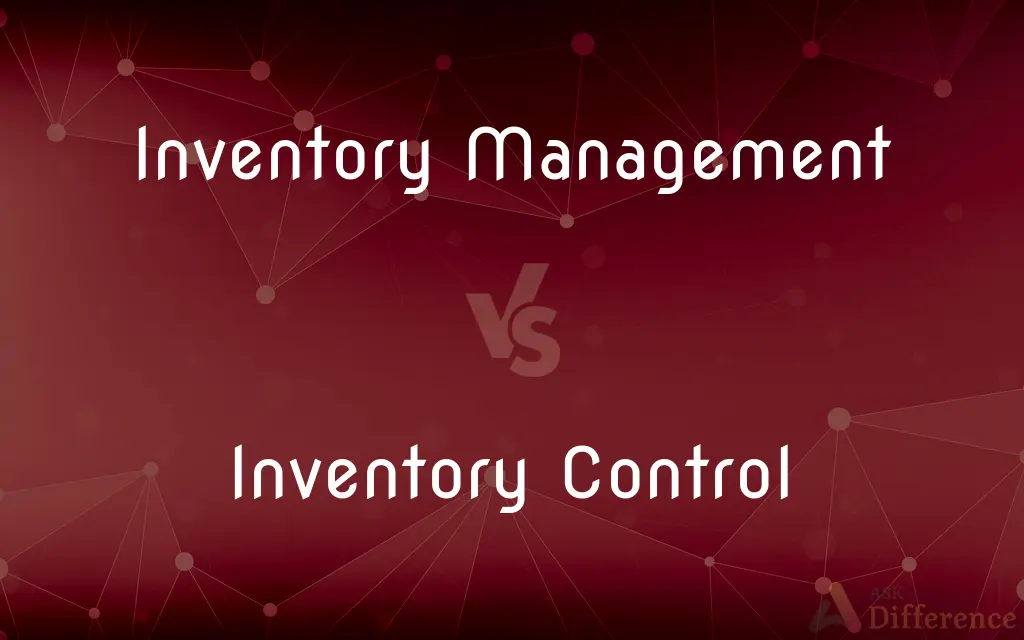Inventory Management vs. Inventory Control — What's the Difference?
By Tayyaba Rehman — Published on October 15, 2023
Inventory Management involves overseeing and controlling stock, while Inventory Control is focused on regulating and maintaining optimal stock levels.

Difference Between Inventory Management and Inventory Control
Table of Contents
ADVERTISEMENT
Key Differences
Inventory Management encompasses an overarching approach toward controlling and overseeing stock from the procurement phase to the sales point. On the opposite spectrum, Inventory Control zeroes in more on the regulatory aspect, ensuring optimal stock levels are maintained without surplus or deficit.
Inventory Management is imperative in developing strategies and processes for purchasing, ordering, and storage, focusing on efficient utilization and flow of goods across all facets of a business. Conversely, Inventory Control primarily deals with determining and maintaining an optimal amount of stock, considering factors like demand, shelf space, and holding cost.
Inventory Management encompasses various elements including, but not limited to, procurement, storage, and distribution of items, aiming for the seamless operation of a business. In contrast, Inventory Control is more confined to the tracking and regulation of existing inventory, striving to prevent stockouts or overstock situations.
Inventory Management also involves elements of forecasting, determining what to order, and identifying how much to invest in stock, thereby aligning inventory investments with predicted customer buying behavior. On the other hand, Inventory Control ensures that these forecasts do not lead to an overabundance or scarcity, by implementing systems to keep stock at designated levels.
On a broader scale, Inventory Management can be seen as a holistic approach towards dealing with inventory, encompassing several activities from purchase to sale. Inventory Control, while being a subset of inventory management, is solely fixated on maintaining and regulating stock levels to facilitate uninterrupted operations.
ADVERTISEMENT
Comparison Chart
Focus
Overarching inventory processes
Regulating existing stock levels
Scope
Broad, from procurement to sale
Narrow, focused on stock levels
Goal
Efficient inventory flow and utilization
Avoiding overstock or stockouts
Activities Involved
Purchasing, storing, distributing
Tracking and regulating stock
Primary Objective
Aligning inventory with business operations
Maintaining optimal stock levels
Compare with Definitions
Inventory Management
Inventory Management incorporates strategic planning of inventory processes.
Zara’s inventory management allows rapid adaptation to changing fashion trends.
Inventory Control
Inventory Control involves tracking and regulating existing inventory.
Inventory control mechanisms at Tesla regulate raw material availability for production.
Inventory Management
Inventory Management is crucial for aligning stock with customer demands.
Through precise inventory management, Apple aligns product availability with product launches.
Inventory Control
Inventory Control ensures regular availability of products.
Inventory control at supermarkets ensures continuous availability of perishable goods.
Inventory Management
Inventory Management aims to ensure optimal stock utilization.
Efficient inventory management enabled Amazon to minimize warehousing costs.
Inventory Control
Inventory Control focuses on maintaining optimal stock levels.
Through stringent inventory control, Nike prevents stockouts during peak seasons.
Inventory Management
Inventory Management integrates procurement, storage, and distribution.
The inventory management at Toyota ensures a smooth flow of parts for manufacturing.
Inventory Control
Inventory Control aims to avoid overstock and stockout situations.
Dell employs inventory control to mitigate excess stock of electronic parts.
Inventory Management
Inventory Management involves overseeing the entire inventory lifecycle.
Walmart utilizes advanced inventory management to synchronize stock levels with demand.
Inventory Control
Inventory Control is pivotal for consistent operational flow.
Efficient inventory control in hospitals ensures constant availability of crucial medical supplies.
Common Curiosities
How does Inventory Control prevent stockouts?
Inventory Control implements systems to track and maintain stock, ensuring optimal levels are always available.
Can Inventory Control influence customer satisfaction?
Absolutely, effective Inventory Control prevents stockouts, ensuring consistent availability of products.
Can Inventory Control systems be automated?
Yes, Inventory Control often uses automated systems to track and regulate stock levels efficiently.
Can Inventory Management be outsourced?
Yes, many businesses outsource Inventory Management to third-party logistics providers.
What technologies are used in Inventory Control?
Technologies like RFID, barcode scanning, and inventory management software are common in Inventory Control.
How does Inventory Management impact businesses?
Effective Inventory Management ensures a smooth, cost-effective flow of goods, impacting operations and customer satisfaction.
What is the main objective of Inventory Management?
Inventory Management aims to optimize the entire process of handling inventory from purchase to sale.
Is Inventory Control relevant for small businesses?
Yes, Inventory Control is crucial for businesses of all sizes to manage stock levels and prevent stock-related issues.
Is Inventory Management only concerned with physical products?
Generally, yes, but Inventory Management can also involve managing intangible or digital goods.
Does Inventory Management involve financial planning?
Yes, Inventory Management includes budgeting and financial planning to optimize inventory investments.
What are common challenges in Inventory Management?
Challenges include demand forecasting, stock level optimization, and managing storage costs.
How does Inventory Control handle surplus stock?
Inventory Control may implement strategies like discounts or sales to reduce surplus without wastage.
How does Inventory Management correlate with supply chain management?
Inventory Management is a vital component of supply chain management, directly impacting procurement, storage, and distribution processes.
Why is real-time data crucial for Inventory Control?
Real-time data ensures immediate response to changes in stock levels, enhancing Inventory Control effectiveness.
Does Inventory Management include product distribution?
Yes, Inventory Management encompasses distribution, ensuring goods reach destinations efficiently.
Share Your Discovery

Previous Comparison
Marines vs. U.S. Army
Next Comparison
Green Berets vs. Navy SEALsAuthor Spotlight
Written by
Tayyaba RehmanTayyaba Rehman is a distinguished writer, currently serving as a primary contributor to askdifference.com. As a researcher in semantics and etymology, Tayyaba's passion for the complexity of languages and their distinctions has found a perfect home on the platform. Tayyaba delves into the intricacies of language, distinguishing between commonly confused words and phrases, thereby providing clarity for readers worldwide.














































